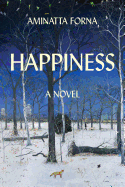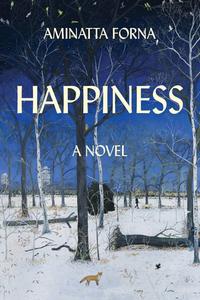
 Happiness, Aminatta Forna's fourth novel, a follow-up to The Hired Man, is about love, trauma, immigration and the ongoing conflict between nature and civilization, among other things. The plot is built around the chance meeting of two outsiders in London: Jean, an American studying urban foxes, and Attila, a Ghanaian psychiatrist in the city to give a keynote speech on trauma. Through their repeated meetings--Attila takes the position that coincidences "happen far too often to be considered extraordinary"--Jean and Attila gradually become insinuated in each other's lives.
Happiness, Aminatta Forna's fourth novel, a follow-up to The Hired Man, is about love, trauma, immigration and the ongoing conflict between nature and civilization, among other things. The plot is built around the chance meeting of two outsiders in London: Jean, an American studying urban foxes, and Attila, a Ghanaian psychiatrist in the city to give a keynote speech on trauma. Through their repeated meetings--Attila takes the position that coincidences "happen far too often to be considered extraordinary"--Jean and Attila gradually become insinuated in each other's lives.
The search for a missing young boy becomes the pretext for a variety of characters to bump into each other, from Jean and Attila to a lot of hotel doormen, security guards and even one man moonlighting as a "living statue." Many of the characters are immigrants--Forna pays particular attention to West African transplants to London. One of the pleasures of the book is seeing how all of these characters and plot elements fit within a narrative that opens in 1834 and bounces between the present and the past.
It would be reductive to refer to Happiness as a love story, but the bond that slowly develops between Jean and Attila is an obvious highlight. Instead of love at first sight, the novel is concerned with a more cautious, perhaps more mature, approach to growing infatuation. Forna writes: "The reckless open their arms and topple into love, as do dreamers, who fly in their dreams without fear or danger. Those who know that all love must end in loss do not fall but rather cross slowly from not knowing into the knowing."
Happiness is not an overtly political book. In fact, it takes place pre-Brexit and so skirts many of the arguments over immigration that have intensified in the wake of the referendum. It takes a broader view, making a case that adverse life experiences and thus trauma are more common to most of the world than sometimes cloistered Western lives of wealth and plenty. Or: "The glass dwellers were terrified of the cloche [bell-shaped lid] being lifted. They treated the suffering of others as exceptional, something that required treatment, when what was exceptional was all this." Attila, who has spent his life venturing into war zones, frequently finds himself uncomfortable with "all this."
Jean and her urban foxes are also struggling to adapt to abnormal circumstances. Her fierce love of animals and nature puts her in conflict with urban dwellers who fear and hate the wild creatures that intrude on their orderly world. Jean's wide-ranging empathy lies at odds with entire communities--like London--and even those close to her, as in her previous marriage. Happiness observes them building a new community, a found family composed of oddballs and outsiders. Forna's novel is unusual and engaging, heartfelt and ambitiously crafted. --Hank Stephenson, bookseller, Flyleaf Books, Chapel Hill, N.C.
Shelf Talker: The lives of an American doing a study on urban foxes and a Ghanaian psychiatrist specializing in trauma collide among the expatriates and immigrants in London.

